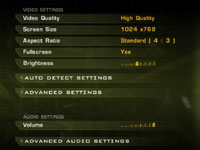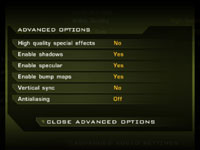R600: ATI Radeon HD 2900 XT
Written by Tim Smalley
May 16, 2007 | 05:39
Tags: #2900 #analysis #anisotropic #architecture #benchmarks #filtering #hd #image #performance #quality #r600 #radeon #review #technology #xt

Quake 4
Publisher: ActivisionWe used the full retail version of Quake 4 patched to version 1.3.0. It's the fourth game in the Quake series, based on the technically sound Doom 3 engine. However, unlike Doom 3, we found that the game benefits from at least 2x anti-aliasing, and the experience with anti-aliasing at a slightly lower resolution was better than increasing the resolution with no AA applied.
Both anti-aliasing and anisotropic filtering were controlled from inside the game. When you select "High Quality" mode, 4xAF is automatically enabled, and when the "Ultra Quality" mode is enabled, 8xAF is automatically applied to the scene.
We used a custom-recorded demo from a section that represents fairly typical performance throughout the rest of the game. We set the in-game details to high quality and left Vsync disabled. Both anti-aliasing and anisotropic filtering were controlled inside the game using console commands. Anti-aliasing was adjusted using the "r_multisamples" cvar, while anisotropic filtering values were set using "image_anisotropy".
Quake 4
1600x1200 4xAA 8xAF, Maximum Quality
- Nvidia GeForce 8800 GTX 768MB SLI
- ATI Radeon X1950 XTX 512MB CrossFire
- BFGTech GeForce 8800 GTS OC 640MB SLI
- BFGTech GeForce 8800 GTS OC 320MB SLI
- ATI Radeon HD 2900 XT 512MB CrossFire
- Nvidia GeForce 8800 Ultra 768MB
- Nvidia GeForce 8800 GTX 768MB
- ATI Radeon HD 2900 XT 512MB
- ATI Radeon X1950 XTX 512MB
- BFGTech GeForce 8800 GTS OC 640MB
- BFGTech GeForce 8800 GTS OC 320MB
- Nvidia GeForce 7900 GTX 512MB
-
-
170.8
-
-
-
155.8
-
-
-
152.5
-
-
-
150.5
-
-
-
138.3
-
-
-
138.2
-
-
-
124.0
-
-
-
120.5
-
-
-
102.9
-
-
-
97.1
-
-
-
94.5
-
-
-
88.8
-
0
25
50
75
100
125
150
175
Frames Per Second
-
Average
Quake 4
1920x1200 4xAA 8xAF, Maximum Quality
- Nvidia GeForce 8800 GTX 768MB SLI
- ATI Radeon X1950 XTX 512MB CrossFire
- BFGTech GeForce 8800 GTS OC 640MB SLI
- ATI Radeon HD 2900 XT 512MB CrossFire
- BFGTech GeForce 8800 GTS OC 320MB SLI
- Nvidia GeForce 8800 Ultra 768MB
- Nvidia GeForce 8800 GTX 768MB
- ATI Radeon HD 2900 XT 512MB
- ATI Radeon X1950 XTX 512MB
- BFGTech GeForce 8800 GTS OC 640MB
- BFGTech GeForce 8800 GTS OC 320MB
- Nvidia GeForce 7900 GTX 512MB
-
-
162.3
-
-
-
143.5
-
-
-
141.4
-
-
-
136.5
-
-
-
131.0
-
-
-
122.4
-
-
-
110.9
-
-
-
109.0
-
-
-
87.8
-
-
-
85.5
-
-
-
83.6
-
-
-
76.9
-
0
25
50
75
100
125
150
175
Frames Per Second
-
Average
Quake 4
2560x1600 2xAA 8xAF, Maximum Quality
- Nvidia GeForce 8800 GTX 768MB SLI
- ATI Radeon HD 2900 XT 512MB CrossFire
- ATI Radeon X1950 XTX 512MB CrossFire
- BFGTech GeForce 8800 GTS OC 640MB SLI
- BFGTech GeForce 8800 GTS OC 320MB SLI
- Nvidia GeForce 8800 Ultra 768MB
- Nvidia GeForce 8800 GTX 768MB
- ATI Radeon HD 2900 XT 512MB
- ATI Radeon X1950 XTX 512MB
- BFGTech GeForce 8800 GTS OC 640MB
- Nvidia GeForce 7900 GTX 512MB
- BFGTech GeForce 8800 GTS OC 320MB
-
-
145.0
-
-
-
128.9
-
-
-
123.2
-
-
-
115.0
-
-
-
109.9
-
-
-
93.0
-
-
-
84.5
-
-
-
82.0
-
-
-
68.7
-
-
-
62.0
-
-
-
60.6
-
-
-
56.5
-
0
25
50
75
100
125
150
Frames Per Second
-
Average
Quake 4
2560x1600 4xAA 8xAF, Maximum Quality
- ATI Radeon HD 2900 XT 512MB CrossFire
- Nvidia GeForce 8800 GTX 768MB SLI
- BFGTech GeForce 8800 GTS OC 640MB SLI
- BFGTech GeForce 8800 GTS OC 320MB SLI
- Nvidia GeForce 8800 Ultra 768MB
- ATI Radeon HD 2900 XT 512MB
- ATI Radeon X1950 XTX 512MB CrossFire
- Nvidia GeForce 8800 GTX 768MB
- ATI Radeon X1950 XTX 512MB
- BFGTech GeForce 8800 GTS OC 640MB
- BFGTech GeForce 8800 GTS OC 320MB
- Nvidia GeForce 7900 GTX 512MB
-
-
119.6
-
-
-
114.3
-
-
-
83.4
-
-
-
79.3
-
-
-
73.6
-
-
-
67.7
-
-
-
66.3
-
-
-
62.5
-
-
-
44.9
-
-
-
43.8
-
-
-
41.1
-
-
-
38.7
-
0
25
50
75
100
125
Frames Per Second
-
Average
Being based on the same engine as Prey, we expected to see similar performance characteristics on the Radeon HD 2900 XT. This was largely the case and at 2560x1600, the Radeon HD 2900 XT not only outperformed the GeForce 8800 GTS by a comprehensive margin, it also managed to the GeForce 8800 GTX its ass in style.
Not only did it beat it in single card mode, but it also managed to beat it in dual card mode too. It's a double whammy, boyo. This is probably thanks to the improvements AMD has made to stencil shadowing in R600.











Want to comment? Please log in.